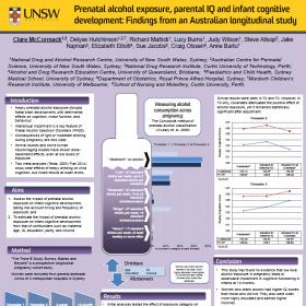Abstract
Introduction: There is evidence of detrimental effects of heavy prenatal alcohol exposure on intellectual ability in childhood. However, less is known about the effects of low to moderate exposure. Studying the isolated effect of alcohol exposure on cognitive development is challenging, due to confounding factors such as parental IQ, socio-economic status, and health. This study aims to examine the effect of low, moderate and heavy prenatal alcohol consumption on infant cognitive development, taking into account the effect of confounds.
Methods: Data from a sample (n=503) of families participating in a longitudinal study will be presented. Participants were recruited from three different hospital antenatal clinics in Sydney, Australia. Detailed information regarding women’s alcohol use was recorded at trimester one, two and three of pregnancy. Infants were assessed in their home at one year of age by skilled researchers using the Bayley Scales of Infant Development III - the gold standard assessment tool for infant development. An estimate of maternal verbal IQ was obtained using the Test of Premorbid Functioning.
Results: Results of statistical analyses investigating whether alcohol consumption across low, moderate and heavy levels predicts scores on the Bayley Scales of Infant Development at age one, taking into account the effect of maternal IQ, will be presented.
Conclusion: A significant number of women continue to consume alcohol during pregnancy, despite public health guidelines advising abstinence. This research provides valuable information about the potential effects of this consumption, which relevant to those in the alcohol research field, public health, and antenatal health. Care is needed when sharing findings on this sensitive issue with the public. This study is unique in incorporating a measure of maternal IQ, and considering this as a factor when assessing infant cognitive development. Continued follow up of a larger sample from this population will further clarify these effects.


